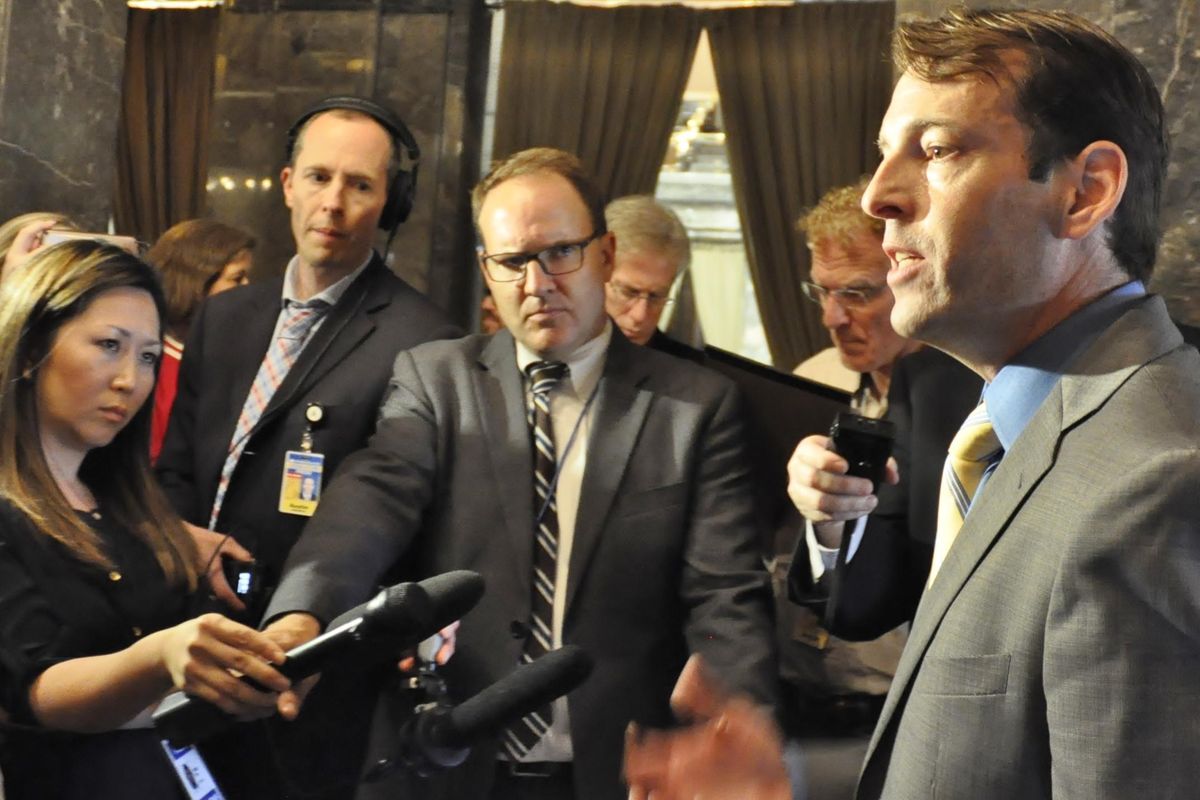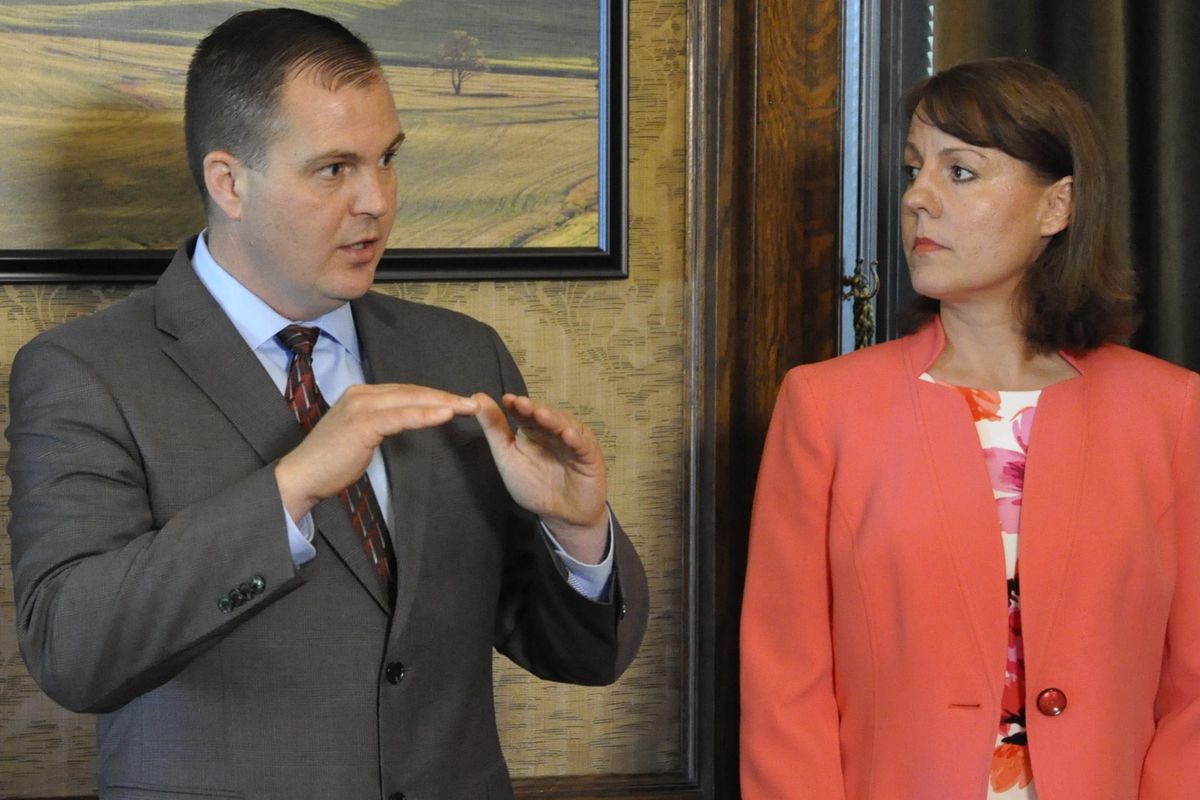Washington Legislature plays beat the clock on historic budget, school changes
OLYMPIA – Sen. Andy Billig, D-Spokane, explains aspects of a major change in state education policy that is tied to the 2017-19 operating budget. Both are expected to come up for a vote Friday. (Jim Camden / The Spokesman-Review)
To follow The Spokesman-Review’s coverage of the budget as it moves through the Legislature Friday, click here.
OLYMPIA – Washington would spend a record amount on government programs and salaries in the next two years, in part to pay for a generational change in public education, under a budget deal expected to pass the Legislature sometime Friday.
To increase the state’s share of public schools funding and cover a wide range of other state programs, it would add to current revenue with a major shift in property taxes, collect sales tax on internet sales and make several other tax changes totaling about $7 billion over four years.
The budget would spend more than $43.3 billion over two years – the exact amount was still being calculated Thursday evening – with full details of it and the school changes listed online about 7 p.m. But legislators who helped negotiate the many compromises over the two-year spending plan and the education revisions briefed reporters on some of the aspects Thursday afternoon.
“It is a budget that really strongly supports Democratic values, funded by a Republican revenue plan,” Sen. Kevin Ranker, D-Orcas Island, said.
Compromise was necessary, several lawmakers said, to reach an agreement on what’s being described as a generational change in the state’s public school system. That change, designed to meet a Washington Supreme Court mandate, calls for increased salaries for teachers and other school staff, starting at $40,000 a year, with regional adjustments to recognize different living costs around the state.
The state would pay for all salaries connected to “basic education”; districts would pay for salaries that cover supplemental activities, which will be listed in state law.
The number of pupils in junior high and high school classes would go down, more money would be spent on schools in high poverty areas, on special education and on programs for the highly capable.
Sen. Andy Billig, D-Spokane, a member of the group that negotiated the education changes, predicted the bill, if it passes, will meet the Washington Supreme Court mandate to improve schools. It was driven by a desire on all sides to help all students in the state reach their highest potential, he said.
“In 20 years, people will look back and say we closed the opportunity gap,” Billig said.
A key element of the education plan is a major shift in the property tax levy system. It would increase the state levy to $2.70 per every $1,000 of assessed value, up from $1.88. At the same time, it would limit the amount a local school district can levy to $1.50 per $1,000 of property values.
When the two are combined on a property owner’s tax statement, some will see decreases and others increases. That’s because school district levies vary widely across the state, with some poor rural districts levying several times that $1.50 limit and some fast-growing urban areas levying much less.
Details of the shifts for each of the state’s 295 school districts were still being checked Thursday night. Preliminary figures showed Spokane Public Schools would see an increase of about 12 percent in spending per student, above adjustments for inflation, over four years. The district’s taxpayers would see a slight decrease in their property taxes, of about 50 cents per $1,000 in 2019, dropping to about 30 cents per $1,000 in 2021.
Taxpayers in Seattle, Bellevue, Bellingham and some other Puget Sound districts would see property tax increases. So would some small districts that currently do not collect a local school levy because their state levy would go up and there would be no offsetting local decrease.
Members of both parties praised the compromise over school policy even though some said they believed there were better ways to pay for it.
Republicans described the changes as a way to even out property taxes across the state, while bringing more equality to what the state contributes for each public school student.
Sen. Ann Rivers, R-Vancouver, another member of the education task force, said it will solve problems that have been “festering” for 30 years.
“No longer will a child’s education be determined by their ZIP code,” Rivers said.
Some Democrats criticized the property tax as more regressive than other options that had been considered.
“There are some winners and some losers with the property tax,” Ranker said. Overall, Democrats were willing to compromise because the budget has programs they support, although some members of both parties in the House and Senate are likely to vote against the budget when it comes to the floor Friday.
“I am confident we have the votes to pass it,” he said.
The state would also try to collect sales tax from internet vendors located out of state for items purchased by Washington residents. Bottled water sold in Washington stores would be subject to the sales tax; right now it’s exempt as a food item.
The business and occupation tax for manufacturers would be reduced over four years. The tax incentives for motion pictures and other films made in Washington would be extended for an extra 10 years.
Friday is the last day of the fiscal year and the day when a budget must be passed and signed to prevent a partial shutdown of state government services and temporary layoff of about 32,000 employees.
To accomplish that, legislators will have to cut it closer than ever before. Two years ago, when Gov. Jay Inslee signed the 2015-17 operating budget just 20 minutes before midnight on June 30, the Legislature had approved the spending plan on June 29, giving his staff time to review the massive document while lawmakers worked on passing policies the budget contained.
Although budget negotiators have been working off and on for months, most lawmakers got their first briefing at 10 a.m. Thursday on a deal that was announced Wednesday morning.

